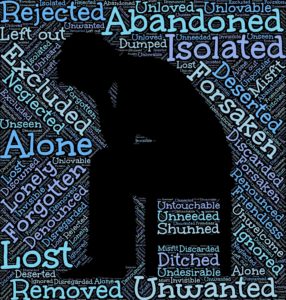 One of the most emotionally scarring events a person can feel is abandonment. When a person has experienced it, it greatly affects how they view themselves. They may feel helpless, incomplete, insignificant, and unwanted despite their personal talents and achievements.
One of the most emotionally scarring events a person can feel is abandonment. When a person has experienced it, it greatly affects how they view themselves. They may feel helpless, incomplete, insignificant, and unwanted despite their personal talents and achievements.
The usual consequence of abandonment is that the one who was abandoned often tries to fill the emptiness inside through the validation of others. Unfortunately, their skewed view of relationships, coupled with their resulting actions, end up further hurting themselves and others.
The Aftereffects of Abandonment
Those who were abandoned often feel that they were “discarded” because they were not lovable or important enough to be cared for. Because of this, they have this emotional need to be “wanted.”
The following are some possible symptoms of abandonment:
- Constant need for reassurance: A sufferer of abandonment issues is usually very insecure, believing that the people they care about might leave them. This causes the sufferer to regularly seek reassurance from loved ones.
They long to hear words like “I will always be here for you,” “You are important to me,” or “I need you.” While this may seem okay at the start as a form of loving need; sadly, this may quickly wear thin on others, especially if the sufferer becomes very anxious, demanding, or manipulative just to feel “loved.”
Moreover, this need for reassurance may affect the sufferer’s emotional balance so that their mood reflects the mood of their romantic partner. If their partner is happy, they too feel happy, thinking that they have done something “right.”
But if their partner is in a negative mood (e.g. angry, disappointed, or sad), the sufferer may believe that this negativity is because of something they did, causing them to go out of their way to make things “okay” again – even if what they do is against their core values.
- Settling for unhealthy relationships: Another symptom of abandonment issues is that the sufferer may choose to be in a very unhealthy, codependent relationship. Many times this means the romantic partner may be abusive, have addiction problems, or both.
Despite warnings from others about the “danger” they are in because of their abusive or addicted partner, the sufferer chooses this situation because they are somehow “needed” in order to take care of or satisfy the abusive tendencies of the addicted partner.
 Their desire to be “wanted” or to “belong” surpasses the issue of personal safety. For such people, should they indeed separate for some reason or another, chances are that they will end up with someone similar to ensure that they are “loved” or “needed” again. It is a sad, vicious cycle.
Their desire to be “wanted” or to “belong” surpasses the issue of personal safety. For such people, should they indeed separate for some reason or another, chances are that they will end up with someone similar to ensure that they are “loved” or “needed” again. It is a sad, vicious cycle.
- Opting for shallow relationships or sabotaging intimate ones: The other possibility relationship-wise is that the sufferer decides to avoid the pain of abandonment by either opting for shallow relationships or sabotaging the intimate ones they are in. For the former, to prevent emotional pain, the sufferer elects to have very shallow relationships. These could be one-night stands or romantic relationships where it is very clear that long-term engagement is NOT an option. Friendship-wise, this may mean the person has many acquaintances but few true friends if any.
However, there are other sufferers who do find themselves in seemingly more intimate relationships. But before things become too serious, the sufferer somehow finds a way to break up, claiming that something is “wrong” with the situation to the dismay of the people around them. The truth of this, whether they are aware of it or not, is that they are afraid to commit 100% only to be abandoned, so they decide to prevent this by rejecting their partner first.
5 Steps to Recover from Relationship Abandonment Issues
Abandonment issues can be overcome, but the sufferer needs to reclaim their emotions. They need to no longer fear the idea of being alone and focus on building a stronger self.
Here are 5 important steps to follow:
1. Assume Responsibility for One’s Emotions
A person who is struggling with abandonment issues usually has an intense desire to be cared for. They often feel that their self-worth is validated only if someone else validates it for them.
Now while this may seem “romantic” to some, as they may believe that they need another person to fully complete them, such a view puts an impossible burden on whomever else may come into the individual’s life. Plus, it is not healthy because one’s personal joy is dependent upon another, giving the person a life of anxiety and fear.
Ending this emotional dependence requires the person to assume responsibility for their emotions, just like everybody else. Though others might still trigger their insecurities, it should be up to the person to believe in themselves.
2. Revise Unrealistic Expectations
 Those who have been abandoned often expect that there is someone out there that can make them feel loved and make up for all the time that they felt alone and neglected. This is why when they find that “someone” they cling to them and expect a lot, making their world revolve around this “emotional savior.”
Those who have been abandoned often expect that there is someone out there that can make them feel loved and make up for all the time that they felt alone and neglected. This is why when they find that “someone” they cling to them and expect a lot, making their world revolve around this “emotional savior.”
Unfortunately, no one is perfect and hardly anyone is willing to try and be that “perfect” person. So eventually, disappointment comes in, particularly when their partner is not able to or is no longer willing to give the love and attention the sufferer craves.
To break free, the sufferer must realize that though relationships are important, their personal joy can never be found in any romantic partner. They must instead take charge of their life and look for personal joy elsewhere. If they can understand this, healthy relationships can be possible in their near future.
3. Learn to Validate Oneself
As earlier mentioned, those with abandonment issues constantly seek external validation. Internally, their traumatic experience has led them to believe that something is “wrong” with them, which is why they need the constant approval of loved ones to affirm they are “important” and “loved.”
To counter this, the sufferer needs to learn how to validate themselves. They need to understand that they are worth loving and that they are important.
Of course, this is easier said than done. This takes time and much introspection, but it can be done through practice or with the help of others. For some, this journey may begin by discovering themselves as they travel, learning something new (e.g. art, computer programming, music), or meeting new people in their interest groups. Others discover joy when they seek a stronger relationship with God. What is important is that they finally come to realize that they can be complete, even if nobody else says so.
4. Be True to Oneself
A side effect of abandonment is that the sufferer may be unaware of who they truly are because they have always been adapting to the needs of others, particularly their significant other. Because of their strong desire to be “wanted,” whatever their partner required of them, they became. Such adaption, however, is not only limited to their partner, but it may also extend to those at school or work as the sufferer craves affirmation wherever and whenever they can get it.
But such a life is very stressful indeed as personal desires are set aside for the sake of the people around. Thus, part of overcoming abandonment includes being true to oneself, even if others might think they are “different.” Thankfully, God made a world full of diversity, so even if the immediate people around might not like the new changes, somebody else will. The sufferer just needs to embrace the idea that it is okay to be different as long as it is their true self.
5. Exercise Self-Confrontation
 Sufferers of abandonment issues are usually masters of control. They have learned how to manipulate others and themselves to ensure their “emotional survival.” Part of such control includes lying about facts, pretending to be someone else, and even attacking others’ faults to get their way.
Sufferers of abandonment issues are usually masters of control. They have learned how to manipulate others and themselves to ensure their “emotional survival.” Part of such control includes lying about facts, pretending to be someone else, and even attacking others’ faults to get their way.
In order to escape this cycle of hurt and pain, the sufferer must also learn how to confront themselves, admit that they are wrong, and then change for the better. If not, they will continue to use these negative tools of manipulation in their future relationships, making life difficult for themselves and others.
Learning how to confront oneself also boosts the sufferer’s self-integrity. Rather than denying their faults, a person who is honest with themselves learns to see who they truly are, allowing them to understand how their actions may run contrary to their core values. Such self-confrontation then gives them the avenue to make the needed changes, rather than passing the blame to others.
Christian Counseling for Abandonment Issues in Relationships
The LORD is close to the brokenhearted and saves those who are crushed in spirit. – Psalm 34:18
Being emotionally dependent because of abandonment issues is not an easy thing to deal with. But given enough focus, effort, and time, a sufferer can take control of their emotions.
However, there are some who have difficulty letting go of their emotional crutches as they are afraid that they are not strong enough to be on their own. And then there are others still that have tried to break free but are not able to obtain personal joy. In such situations, Christian counseling is needed to overcome the mental and emotional chains that hold the sufferer back.
Just like in secular therapy, the Christian counselor will use the latest therapeutic techniques to help the sufferer confront their abandonment issues and change their perception of themself and others. But most importantly, the sufferer’s relationship with God will be strengthened through prayer and meditation on Scripture. Although no human relationship can ever hope to fill the emptiness inside, a supernatural connection to our loving and merciful God can!
If you or a friend is dealing with abandonment issues, seek professional help soon. It is only with God’s help that a person can learn to finally love themself and others in the right way.
Photos:
“Abandoned”, Courtesy of Johnhain, Pixabay.com, CC0 License; “Fear of Abandonment”, Courtesy of Rebcenter Moscow, Pixabay.com, CC0 License; “Pretty Woman”, Courtesy of RondellMelling, Pixabay.com, CC0 License; “Into the Wild”, Courtesy of Joshua Earle, Unsplash.com, CC0 License
-
Kate Motaung: Curator
Kate Motaung is the Senior Writer, Editor, and Content Manager for a multi-state company. She is the author of several books including Letters to Grief, 101 Prayers for Comfort in Difficult Times, and A Place to Land: A Story of Longing and Belonging...





